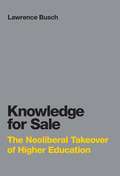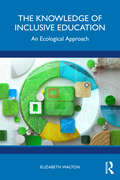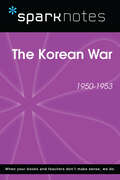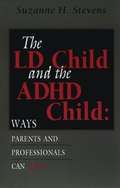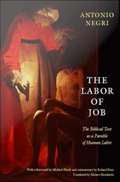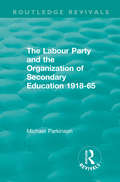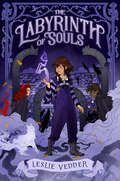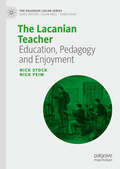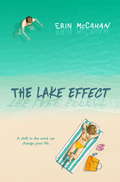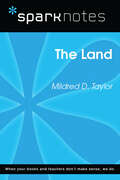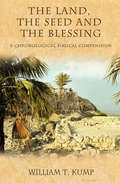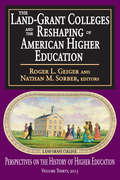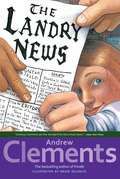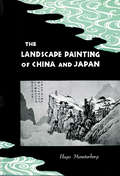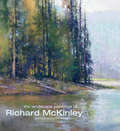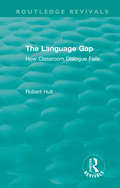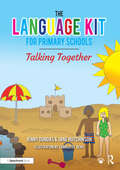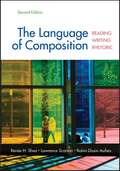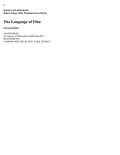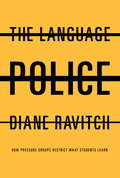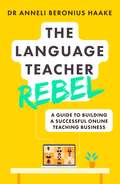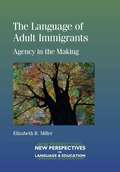- Table View
- List View
The Knowledge for Sale: The Neoliberal Takeover of Higher Education
by Lawrence BuschA new philosophy of higher education has taken hold in institutions around the world. Its supporters disavow the pursuit of knowledge for its own sake and argue that the only knowledge worth pursuing is that with more or less immediate market value. Every other kind of learning is downgraded, its budget cut. In Knowledge for Sale, Lawrence Busch challenges this market-driven approach.The rationale for the current thinking, Busch explains, comes from neoliberal economics, which calls for reorganizing society around the needs of the market. The market-influenced changes to higher education include shifting the cost of education from the state to the individual, turning education from a public good to a private good subject to consumer demand; redefining higher education as a search for the highest-paying job; and turning scholarly research into a competition based on metrics including number of citations and value of grants. Students, administrators, and scholars have begun to think of themselves as economic actors rather than seekers of knowledge.Arguing for active resistance to this takeover, Busch urges us to burst the neoliberal bubble, to imagine a future not dictated by the market, a future in which there is a more educated citizenry and in which the old dichotomies -- market and state, nature and culture, and equality and liberty -- break down. In this future, universities value learning and not training, scholarship grapples with society's most pressing problems rather than quick fixes for corporate interests, and democracy is enriched by its educated and engaged citizens.
The Knowledge of Inclusive Education: An Ecological Approach
by Elizabeth WaltonThe Knowledge of Inclusive Education is a paradigm-shifting exploration of inclusive education as a dynamic knowledge practice. The knowledge that underpins the practice is understood through the metaphor of an ecology, with valuable contributions from educators, researchers, parents, students, policymakers, and international organisations.By examining the knowledge of policy, research, teacher education, and activism, Elizabeth Walton constructs a future for inclusive education that affirms different material-discursive places, inquiry, and possibility and replaces traditional research hierarchies with a life-affirming ecology. Readers will gain a novel perspective on the knowledge/s of inclusive education across multiple interacting domains.With theoretical resources ranging from the work of Lorraine Code and Basil Bernstein to concepts from Legitimation Code Theory, Decolonial theory, and Posthumanism, this book offers a unique and innovative approach to the multiple perspectives and knowledges that inform inclusive education policy and practice. Its conceptual and empirical research draws from several international contexts, ensuring that The Knowledge of Inclusive Education will be of interest to educators, scholars, and advocates of inclusive education worldwide and valued by those willing to embrace collaborative new directions in inclusive teaching, learning, and research.
The Korean War (SparkNotes History Notes)
by SparkNotesThe Korean War (1950-1953) (SparkNotes History Note) Making the reading experience fun! SparkNotes History Guides help students strengthen their grasp of history by focusing on individual eras or episodes in U.S. or world history. Breaking history up into digestible lessons, the History Guides make it easier for students to see how events, figures, movements, and trends interrelate. SparkNotes History Guides are perfect for high school and college history classes, for students studying for History AP Test or SAT Subject Tests, and simply as general reference tools.Each note contains a general overview of historical context, a concise summary of events, lists of key people and terms, in-depth summary and analysis with timelines, study questions and suggested essay topics, and a 50-question review quiz.
The LD Child and the ADHD Child: Ways Parents and Professionals Can Help
by Suzanne H. StevensPractical information about what you can do when your child is diagnosed as LD or ADHD.
The Lab: Creativity and Culture
by David EdwardsNever has the spirit of innovation been more highly valued than today. Around the world, people see the hard-to-teach skills of creativity as the lifeblood of cultural change and the engine of economic development. In The Lab, David Edwards presents a blueprint for revitalizing labs with "artscience"? creative thought that erases conventional boundaries between art and science?to produce innovations that otherwise might never see the light of day. At the heart of The Lab is "cultural incubation," whereby ideas translate with free-wheeling public exchange through a kind of innovation funnel—from educational settings (as in The Lab at Harvard University), to cultural settings (as at Le Laboratoire in Paris and elsewhere), to realizations as innovative products or humanitarian initiatives (within LaboGroup and other translation labs around the globe). With examples ranging from breathable chocolate (Le Whif) to contemporary art installations that explore the neuroscience of fear, Edwards shows how a measured-risk, seed-investment, mentorship-focused network of labs can allow exotic, unexpected ideas to flourish without being killed off at the first hint of impracticality. Unique to the innovation funnel is how creator risk is encouraged but also managed by mentors and others in each lab, so that the most daring ideas—lighting African villages with microbiotic lamps, or cleaning the air with plant-based filters—can emerge within passionate and sometimes inexperienced creative bands. Lively and engaging, replete with anecdotes that bring Edwards's unique personal experience in developing artscience labs to life, The Lab approaches innovation from exciting new angles, finding invigorating ways to repurpose our most creative assets—in scientific exploration, artistic imagination, and business model-building. David Edwards teaches at Harvard University in the School of Engineering and Applied Sciences. His creative work is described at www.davidideas.com.
The Labor of Job: The Biblical Text as a Parable of Human Labor
by Antonio NegriIn The Labor of Job, the renowned Marxist political philosopher Antonio Negri develops an unorthodox interpretation of the Old Testament book of Job, a canonical text of Judeo-Christian thought. In the biblical narrative, the pious Job is made to suffer for no apparent reason. The story revolves around his quest to understand why he must bear, and why God would allow, such misery. Conventional readings explain the tale as an affirmation of divine transcendence. When God finally speaks to Job, it is to assert his sovereignty and establish that it is not Job's place to question what God allows. In Negri's materialist reading, Job does not recognize God's transcendence. He denies it, and in so doing becomes a co-creator of himself and the world. The Labor of Job was first published in Italy in 1990. Negri began writing it in the early 1980s, while he was a political prisoner in Italy, and it was the first book he completed during his exile in France (1983-97). As he writes in the preface, understanding suffering was for him in the early 1980s "an essential element of resistance. . . . It was the problem of liberation, in prison and in exile, from within the absoluteness of Power. " Negri presents a Marxist interpretation of Job's story. He describes it as a parable of human labor, one that illustrates the impossibility of systems of measure, whether of divine justice (in Job's case) or the value of labor (in the case of late-twentieth-century Marxism). In the foreword, Michael Hardt elaborates on this interpretation. In his commentary, Roland Boer considers Negri's reading of the book of Job in relation to the Bible and biblical exegesis. The Labor of Job provides an intriguing and accessible entry into the thought of one of today's most important political philosophers.
The Labour Party and the Organization of Secondary Education 1918-65 (Routledge Revivals)
by Michael ParkinsonOriginally published in 1970, Michael Parkinson examines the Labour Party’s attitude towards secondary education in general and comprehensive schooling in particular and shows the effect of the party’s philosophy on the question of education and its social importance. The Labour Party is seen both as a policy-maker with the power to implement policies and as a pressure group with power only to influence. The case study provides valuable background reading to the controversies over comprehensive education at the time.
The Labyrinth of Souls
by Leslie Vedder"Your next favorite book featuring a magical school is here. Get this one for young readers in your life who want their stories full of action, adventure, fantasy, and mystery." —Lora Senf, Bram Stoker Award-winning author of the Blight Harbor booksA darkly inventive fantasy for fans of Tim Burton about a girl who can see Nightmare creatures from the forbidden Labyrinth of Souls.In the Kingdom of Spinar, there are seven rules for safeguarding your soul from the Sorrows and Nightmare creatures—most importantly: never, ever enter the Labyrinth of Souls.Ix Tatterfall has always been an outcast with big secrets: She can cross into the Labyrinth, home to the powerful Sorrows, and she can see strange Nightmare beasts when no one else can. Some, like the shadowy Inklings or bothersome Stubbed Toads, are merely a nuisance. Many more—like the Jimber-Jawed Hounds—are dangerous. Even deadly.But something is very wrong in the Labyrinth. A terrible new Nightmare—a raggedy scarecrow called Jack—has been ravaging the misty maze, gobbling up wraiths and lost souls and allowing Nightmares to seep into the Waking World.On one forbidden trip, Ix comes face to face with Jack. Worse, she&’s apprehended by Candle Corps, an elite magical group that protects the kingdom against Nightmares. Instead of exile, Ix is allowed to enter the mysterious Candle Corps Academy. For the first time, she&’s surrounded by others who can see what she sees: Morrigan Bea, a hot-tempered girl who might be a monster; Ollie Pembrooke, a shy boy who loves books and Dreamchaser dogs; and Hanky the Inkling, Ix&’s faithful Nightmare companion. But more and more Nightmares are bleeding into Spinar. Raggedy Jack is on the hunt for something—someone—from the Waking World.Ix Tatterfall herself.
The Lacanian Teacher: Education, Pedagogy and Enjoyment (The Palgrave Lacan Series)
by Nick Peim Nick StockWhat does it mean to be a Lacanian teacher? This book responds through three avenues: what Lacan had to say about teaching, how Lacan taught his seminars, and what his theoretical ideas might have to say about teaching in general. The authors propose a rethinking of the teacher, the relationship between teacher and their fantasmatic educational landscape, a deconstruction of pedagogy, and a consideration of the teacher's enjoyment. An original understanding of the ontological dimension of education is proposed, along with an account of the implications this has for the thinking and being of a teacher. This book represents a valuable addition to the emerging body of Lacanian critical work in education and offers fresh insights for practitioners and scholars in the fields of education and psychoanalysis.
The Lake Effect
by Erin MccahanA funny, bracing, poignant YA romance and coming-of-age for fans of Huntley Fitzpatrick, Me and Earl and the Dying Girl, and The Beginning of Everythinglake effect | n.1. The effect of any lake, especially the Great Lakes, in modifying the weather in nearby areas2. The effect of elderly ladies, mysterious girls, and countless funerals, in upending your life, one summer at the beachIt’s the summer after senior year, and Briggs Henry is out the door. He's leaving behind his ex-girlfriend and his parents’ money troubles for Lake Michigan and its miles of sandy beaches, working a summer job as a personal assistant, and living in a gorgeous Victorian on the shore. It's the kind of house Briggs plans to buy his parents one day when he’s a multi-millionaire. But then he gets there. And his eighty-four-year-old boss tells him to put on a suit for her funeral.So begins a summer of social gaffes, stomach cramps, fraught beach volleyball games, moonlit epiphanies, and a drawer full of funeral programs. Add to this Abigail, the mystifying girl next door on whom Briggs's charms just won’t work, and “the lake effect” is taking on a whole new meaning.Smart, funny, and honest, The Lake Effect is about realizing that playing along is playing it safe, and that you can only become who you truly are if you’re willing to take the risk.“Every word glows with brilliance." —Francisco X. Stork, author of Marcelo in the Real World“Observant, sarcastic, compelling, and very funny.” —Kirkus Reviews (starred review)“The perfect smart, beachside read. . . . Unforgettable.” —Stephanie Elliot, author of Sad Perfect "Elegant and touching." —Publishers Weekly“Refreshingly honest and real. . . . An absolute must-read.” —Elise Allen, co-author of Elixir
The Land (SparkNotes Literature Guide Series)
by SparkNotesThe Land (SparkNotes Literature Guide) by Mildred D. Taylor Making the reading experience fun! Created by Harvard students for students everywhere, SparkNotes is a new breed of study guide: smarter, better, faster. Geared to what today's students need to know, SparkNotes provides: *Chapter-by-chapter analysis *Explanations of key themes, motifs, and symbols *A review quiz and essay topicsLively and accessible, these guides are perfect for late-night studying and writing papers
The Land, the Seed and the Blessing: A Chronological Biblical Compendium
by William T. KumpA profoundly detailed and comprehensive handbook that brings order and clarity to the many stories of the Bible. The Land, the Seed and the Blessing is a unique and comprehensive handbook to the Bible that lays out the events of the Bible in chronological order and details where they occurred. Its unique organization reveals the many stories of the Bible as if it were a sprawling, page-turning historic novel. The clarity of Kump&’s Herculean efforts serves to deepen one&’s relationship to the Bible, faith, and God. The Land, the Seed and the Blessing is perfect for the average pew sitter who cannot put it all together; the young parent-inquirer who is somewhat intimidated about church and Bible; students in a college level semester Bible course; and preachers who want to do the Bible in 48 sermons of 20 to 50 minutes each.
The Land-Grant Colleges and the Reshaping of American Higher Education (Perspectives On The History Of Higher Education Ser.)
by L. Geiger RogerThis work provides a critical reexamination of the origin and development of America's land-grant colleges and universities, created by the most important piece of legislation in higher education. The story is divided into five parts that provide closer examinations of representative developments.Part I describes the connection between agricultural research and American colleges. Part II shows that the responsibility of defining and implementing the land-grant act fell to the states, which produced a variety of institutions in the nineteenth century. Part III details the first phase of the conflict during the latter decades of the nineteenth century about whether land colleges were intended to be agricultural colleges, or full academic institutions. Part IV focuses on the fact that full-fledged universities became dominant institutions of American higher education. The final part shows that the land-grant mission is alive and well in university colleges of agriculture and, in fact, is inherent to their identity.Including some of the best minds the field has to offer, this volume follows in the fine tradition of past books in Transaction's Perspectives on the History of Higher Education series.
The Landry News: Frindle; The Landry News; The Janitor's Boy (Juvenile Ser.)
by Andrew ClementsNEW STUDENT GETS OLD TEACHER The bad news is that Cara Landry is the new kid at Denton Elementary School. The worse news is that her teacher, Mr. Larson, would rather read the paper and drink coffee than teach his students anything. So Cara decides to give Mr. Larson something else to read—her own newspaper, The Landry News. Before she knows it, the whole fifth-grade class is in on the project. But then the principal finds a copy of The Landry News, with unexpected results. Tomorrow’s headline: Will Cara’s newspaper cost Mr. Larson his job?
The Landscape Painting of China and Japan
by Hugo MunsterbergThe Landscape Painting of China and Japan presents for the first time in English a full and lucid account of the remarkable art form which, as a distinct tradition in Oriental art, has come to be universally recognized as one of the greatest in the world. <P><P>The author points out how essential it is to an understanding of the Orient when he says: "In China alone, landscape painting has religious as well as philosophical significance...and in consequence is one of the great manifestations of the human spirit, as well as the most remarkable creation of the Chinese artistic genius." And it was this same artistic tradition which, brought to Japan, was transmuted by the intense Japanese love of nature into paintings that "for sheer beauty of color and design have few equals," leading at last to the simplicity and grandeur of the uniquely Japanese woodblock print.Writing for scholar and layman alike, the author carefully traces the evolution of the art throughout its long history, discusses the major artistic personalities against their cultural backgrounds, and systematically describes the development and forms of the landscape. The text is thoroughly illustrated with over a hundred carefully selected plates and a colored frontispiece.
The Landscape Paintings of Richard McKinley: Selected Works in Oil and Pastel
by Richard MckinleyThe Landscape Paintings of Richard McKinley invites you to experience the artist's life work and lessons learned. In this impressive yet intimate collection of 100 breathtaking pastel and oil landscape paintings, McKinley takes you along as he tackles his favorite subjects--the the vistas of the Pacific Northwest, the California coastline, fall in Taos, New Mexico, and many others--while sharing the anecdotes, techniques and feelings behind each work. This volume is, in essence, three books in one: A salute to the beauty of our earth. Scenes (many completed en plein air) range from McKinley's home state of Oregon, to the arid deserts of Arizona, to Minnesota's lakes and France's Provence region. The personal journey of one artist. His walks through the woods. His race with light. The people and places that have inspired him along the way. The landscape-painting workshop of a lifetime. It's packed with expert insights on everything from working on location and the importance of preparatory sketches, to using underpainting, capturing light effects, and knowing when to stop. A compelling read for artists and art-lovers alike, every page resonates with McKinley's love of his craft, lifetime of know-how and knack for helping other artists discover their own original views of the world.
The Landscape Photographer's Field Guide: Capturing the Great Outdoors with your Digital SLR Camera
by Carl Heilman IILandscape photography remains one of the most popular genres for enthusiast and commercial photographers alike, but all of the books on the market are large in format and unsuited to use in the field. This latest addition to Ilex's popular Field Guide series meets this need perfectly, with Carl Heilman's unique expertise and brilliant photos presented for the first time in a go-anywhere format.Covering key areas like equipment, exposure, weather and post-processing, and with a handy ready-reference section in the back of the book, The Landscape Photography Field Guide will become an essential companion on any shooting trip.
The Language Gap: How Classroom Dialogue Fails (Routledge Revivals)
by Robert HullPublished in 1985. Dialogue between teacher and pupil is a crucial factor in the learning experience. This book questions the role of language as a ‘natural’ vehicle for learning and considers how it may, in fact, hinder communication. In a detailed examination of day-to-day language practices across a range of subjects, including English, History, Maths and Remedial teaching, in a particular comprehensive school, Robert Hull develops a powerful and coherent critique of the closed and limiting nature of the language employed by classroom teachers. By analysing the texts of school knowledge – worksheets, textbooks and teacher’s talk – and relating pupils’ views and responses to teachers’ intentions and attitudes, he indicates how pupils are denied access to that knowledge, and prevented from sharing their own, by those very practices which are intended to facilitate learning – talk which actually gets in the way of learning. Written by a schoolteacher for schoolteachers, this book should help any training or practising teacher in the primary or secondary context concerned with the crucial relationship between language and learning to develop an alternative approach, and so make better sense in the classroom.
The Language Kit for Primary Schools: Talking Together
by Jenny Dundas Jane HutchinsonThe Language Kit for Primary Schools is a comprehensive toolkit for teachers, SENCOs and teaching assistants who deliver group interventions in order to support language and communication in schools. Key features of the kit include: suggested strategies with clear guidelines to help practitioners to support spoken language difficulties; detailed instructions describing how to run and deliver language groups to maximize effectiveness; and, two intervention programmes including session plans, structured activities and photocopiable handouts, ensuring that everything necessary to run the group is in one place. Programmes are: a ten week programme for use with Key Stage 1 pupils. This may also be used with Foundation Stage children; a ten week programme for use with Key Stage 2 pupils. This may also be used with Key Stage 3 students; suggestions for simplifying or extending every activity, enabling the practitioner to differentiate and meet the needs of everyone in the group; an additional resource bank and activity ideas to allow further development of language groups. Written in a clear and concise style by a Speech and Language Therapist and a Specialist teacher of Speech, Language and Communication, this resource will allow practitioners to give pupils the best possible language support.
The Language Of Composition: Reading, Writing, Rhetoric
by Lawrence Scanlon Robin Aufses Renee SheaThe Language of Composition is the first textbook built from the ground up to help students succeed in the AP English Language course. Written by a team of experts with experience in both high school and college, this text focuses on teaching students the skills they need to read, write, and think at the college level. With practical advice and an extensive selection of readings -- including essays, poetry, fiction, and visual texts --The Language of Composition helps students develop the key skills they must master to pass the course, to succeed on the AP Exam, and to prepare for a successful college career. Revised based on feedback from teachers across the country, the second edition promises to be an even better resource for the AP Language classroom.
The Language Of Film (Basics Film-making Ser.)
by Robert Edgar Steven Rawle John MarlandAn effective filmmaker needs to have a good understanding of how film language works, and more importantly, how to actively influence an audience's thoughts and feelings and guide their gaze around the screen. Packed with examples from classic and contemporary cinema, The Language of Film reveals the essential building blocks of film and explains how the screen communicates meaning to its audience. You will learn about fundamental theories and concepts, including film semiotics, narrative structures, ideology, and genre, as well as how elements such as shot size, camera movement, editing technique, and color come together to create the cinematic image. With insightful case studies and discussion questions, dozens of practical tips and exercises, and a new chapter on film sound, this new edition of The Language of Film is a must-have guide for aspiring filmmakers.
The Language Police
by Diane RavitchIf you're an actress or a coed just trying to do a man-size job, a yes-man who turns a deaf ear to some sob sister, an heiress aboard her yacht, or a bookworm enjoying a boy's night out, Diane Ravitch's internationally acclaimed The Language Police has bad news for you: Erase those words from your vocabulary!Textbook publishers and state education agencies have sought to root out racist, sexist, and elitist language in classroom and library materials. But according to Diane Ravitch, a leading historian of education, what began with the best of intentions has veered toward bizarre extremes. At a time when we celebrate and encourage diversity, young readers are fed bowdlerized texts, devoid of the references that give these works their meaning and vitality. With forceful arguments and sensible solutions for rescuing American education from the pressure groups that have made classrooms bland and uninspiring, The Language Police offers a powerful corrective to a cultural scandal.From the Trade Paperback edition.
The Language Teacher Rebel: A guide to building a successful online teaching business
by Anneli Beronius HaakeDo you want to start teaching a language online, be your own boss and be able to work from anywhere that has wifi? Do you want to make a difference in the world by using your language skills to empower people and give them the confidence they need to develop? This timely book covers everything needed to set up a successful online language teaching business, from creating the right mindset, tech and marketing, to designing products and services, finding students online, growing your business and more. More than a manual, it is also a rallying call for language teachers - or language teacher rebels - to share cultural values beyond the traditional classroom and encourage integration on a worldwide scale. An accompanying Language Teacher Rebel Toolkit, containing a comprehensive set of editable, effective and time-saving templates for all the essential documents needed to set up and run an online language teaching business, is available for sale at library.teachyourself.com. Including planners, email scripts and financial templates, this toolkit has everything you need to get organised and get teaching.
The Language Teacher Rebel: A guide to building a successful online teaching business
by Anneli Beronius HaakeDo you want to start teaching a language online, be your own boss and be able to work from anywhere that has wifi? Do you want to make a difference in the world by using your language skills to empower people and give them the confidence they need to develop? This timely book covers everything needed to set up a successful online language teaching business, from creating the right mindset, tech and marketing, to designing products and services, finding students online, growing your business and more. More than a manual, it is also a rallying call for language teachers - or language teacher rebels - to share cultural values beyond the traditional classroom and encourage integration on a worldwide scale. An accompanying Language Teacher Rebel Toolkit, containing a comprehensive set of editable, effective and time-saving templates for all the essential documents needed to set up and run an online language teaching business, is available for sale at library.teachyourself.com. Including planners, email scripts and financial templates, this toolkit has everything you need to get organised and get teaching.
The Language of Adult Immigrants
by Elizabeth R. MillerThis book is the first to explore the constitution of language learner agency by drawing on performativity theory, an approach that remains on the periphery of second language research. Though many scholars have drawn on poststructuralism to theorize learner identity in non-essentialist terms, most have treated agency as an essential feature that belongs to or inheres in individuals. By contrast, this work promotes a view of learner agency as inherently social and as performatively constituted in discursive practice. In developing a performativity approach to learner agency, it builds on the work of Vygotsky and Bakhtin along with research on 'agency of spaces' and language ideologies. Through the study of discourses produced in interviews, this work explores how immigrant small business owners co-construct their theories of agency, in relation to language learning and use. The analysis focuses on three discursive constructs produced in the interview talk-subject-predicate constructs, evaluative stance, and reported speech-and investigates their discursive effects in mobilizing ideologically normative, performatively realized agentive selves.
